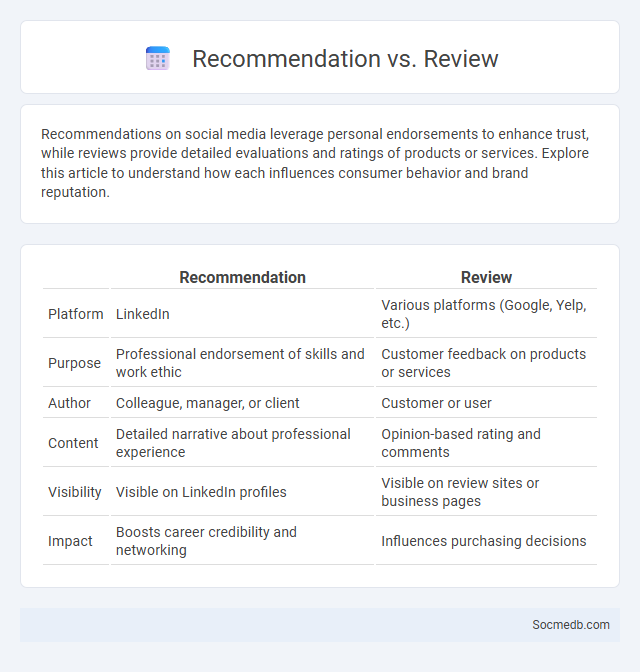
Photo illustration: Recommendation vs Review
Recommendations on social media leverage personal endorsements to enhance trust, while reviews provide detailed evaluations and ratings of products or services. Explore this article to understand how each influences consumer behavior and brand reputation.
Table of Comparison
| Recommendation | Review | |
|---|---|---|
| Platform | Various platforms (Google, Yelp, etc.) | |
| Purpose | Professional endorsement of skills and work ethic | Customer feedback on products or services |
| Author | Colleague, manager, or client | Customer or user |
| Content | Detailed narrative about professional experience | Opinion-based rating and comments |
| Visibility | Visible on LinkedIn profiles | Visible on review sites or business pages |
| Impact | Boosts career credibility and networking | Influences purchasing decisions |
Understanding Recommendations and Reviews
Understanding social media recommendations and reviews involves analyzing user-generated content to gauge product and service credibility, leveraging algorithms that prioritize relevant and authentic feedback. Platforms like Facebook, Instagram, and Twitter employ machine learning techniques to tailor suggestions based on user behavior, enhancing decision-making processes. Accurate interpretation of these recommendations and reviews empowers consumers to make informed purchases and fosters trust in digital marketplaces.
Key Differences Between Recommendations and Reviews
Recommendations on social media typically come from trusted friends or influencers, focusing on personalized suggestions and endorsements based on individual preferences. Reviews provide detailed evaluations from a broader audience, emphasizing product or service quality, user experience, and ratings. The key difference lies in recommendations driving trust through personal connections, while reviews offer objective insights to inform purchasing decisions.
What Constitutes a Recommendation?
A recommendation on social media involves endorsements such as likes, shares, comments, and reviews that signal trust and value to users. Platforms like Facebook, Instagram, and LinkedIn use algorithmic analysis of these interactions to highlight content deemed relevant and credible. User-generated recommendations influence purchasing decisions, brand reputation, and content visibility, making authentic engagement crucial for effective social media marketing.
Exploring the Nature of a Review
A social media review captures user experiences and opinions, reflecting authentic customer sentiment toward products or services. It often includes qualitative feedback that influences brand reputation and purchasing decisions across platforms like Facebook, Instagram, and Twitter. Analyzing these reviews provides valuable insights into consumer preferences and emerging trends within digital communities.
Recommendation vs. Review: Purpose and Intent
Recommendations guide you toward products or services based on personalized experiences and trusted opinions, aiming to influence your decision-making with positive endorsements. Reviews provide objective evaluations, detailing both strengths and weaknesses to inform your understanding of the product's overall quality. Understanding the distinction between recommendation intent and review purpose helps you make more informed choices on social media platforms.
How Recommendations Influence Decision-Making
Social media recommendations significantly influence decision-making by leveraging personalized algorithms that analyze Your preferences and behavior to present relevant content and products. These tailored suggestions create a sense of trust and social proof, increasing the likelihood of You choosing a recommended option. The interactive nature of social platforms amplifies this effect by incorporating user reviews, ratings, and endorsements, shaping Your purchasing and engagement choices.
The Role of Reviews in Consumer Choices
Consumer choices on social media platforms are heavily influenced by user-generated reviews, which provide authentic insights and build trust. Reviews act as social proof, helping potential buyers evaluate product quality and service reliability before making decisions. High ratings and detailed feedback significantly increase conversion rates and brand reputation in the digital marketplace.
Trustworthiness: Are Recommendations or Reviews More Reliable?
Trustworthiness in social media hinges on the authenticity and transparency of recommendations and reviews, with user-generated reviews often providing a more comprehensive insight due to firsthand experiences. Verified purchase badges and detailed user profiles enhance credibility, while sponsored or influencer endorsements may carry biases linked to promotional motives. Data analytics show that consumers tend to trust reviews with higher variance in opinions over uniformly positive recommendations, reflecting a more balanced perspective.
When to Use a Recommendation versus a Review
You should use a recommendation when you want to highlight a product or service based on personal satisfaction and trust, often suggesting it to others with confidence. Reviews are best suited for providing detailed evaluations and balanced opinions, including both pros and cons, helping your audience make informed decisions. Leveraging recommendations on your social media can build trust quickly, while thoughtful reviews add credibility and depth to your content.
Conclusion: Choosing Between Recommendation and Review
Choosing between social media recommendations and reviews depends on the desired level of detail and trustworthiness. Recommendations offer brief, personalized endorsements often from friends or influencers, providing quick insights. Reviews deliver more comprehensive feedback from a broader audience, helping users make informed decisions based on varied experiences.
 socmedb.com
socmedb.com